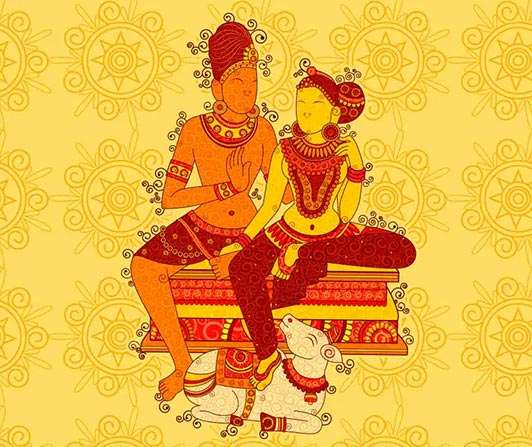[Mahadevi]
Great goddess, a common epithet for Parvathi the consort of Shiva.

▵ Shiva and Parvati’s Strange Wedding
There is a beautiful story in the yogic lore. The wedding between Shiva the Adiyogi and Parvati was a grand affair. Since Parvati was a princess, the “who’s who” of the region were invited – kings and queens, gods and goddesses, each in their finery, one more beautiful than the other.
And then came the groom, Shiva – dreadlocked, matted hair, smeared from head to toe in ash, wearing the fresh skin of an elephant, dripping with blood. He came fully inebriated, completely blissed out. His entourage was all demented and distorted beings, not of human form. They were making all kinds of noises among themselves in a language that no one could understand.
Parvati’s mother, Meena, looked at this groom and fainted! Parvati went and begged Shiva, “I don’t mind the way you are. All I want is you, the way you are. But for my mother’s sake just show a little more pleasant self.”
Shiva agreed and put on a very beautiful form, attired himself well, and then came to the wedding again. When they saw Shiva transformed, they said he was a Sundaramurti. That means he was the most beautiful human being they had ever seen. He was nine feet tall. They say when Shiva stood, he was level with a horse’s head. When he came down to southern India, they said he was twice the height of an average woman there, who were generally four-and-a-half to five feet tall. He was approximately nine feet tall, the most beautiful man, and everyone was awestruck by his presence.
▵ Shiva And Parvati: When An Ascetic Married A Princess
Shiva sat down for the marriage. In India, especially with this kind of wedding, the antecedents of the bride and the groom are announced with great pride. They tell of their ancestry, where they come from, how pure their blood is, and trace back the whole family tree.
For the bride, Parvati’s father Himavat was the King of the Himalayan mountain region. Many glorious things were said about the bride’s lineage. Now they asked, “What about the groom?”
Shiva simply sat quietly, remaining silent. He said nothing. None of his accompanying entourage could speak any recognizable language. They were making cacophonic noises. The bride’s father was disgraced by this: “A man without antecedents. How will he marry my daughter? Nobody knows where he comes from, who his parents are, what his lineage is. How can I give my daughter to this man?” He rose up in anger.
Then sage Narada, who was also a wedding guest, stepped forward with his single-stringed instrument called an ekatara. He plucked the single string, “tangg, tangg, tangg.”
The king got even angrier. “What are you playing the ekatara for?”
Narada said, “This is his antecedence. He has no father, he has no mother.”
“Then what is his basis?”
“Tangg… His basis is sound, reverberation. He is born out of reverberation. He has no parentage, no antecedents, no lineage. He is swayambhu – self-created, a being without antecedents.”
The king was freaking out, but the wedding happened.
▵ Shiva & Parvati’s Marriage: The Symbolism of the Story
The story is a reminder that when we talk of Adiyogi, we are not talking of a genteel, civilized man but of a primal figure, in a state of absolute oneness with life. He is pure consciousness, completely without pretention, never repetitive, always spontaneous, forever inventive, ceaselessly creative. He is simply life itself
That is the fundamental requirement of the spiritual process. If you sit here as a mere bundle of thoughts, beliefs and opinions – that is, with a memory stick that you have picked up from outside – you are simply enslaved to the psychological process. But if you sit here as a piece of life, you become one with the existential process. If you are willing, you can access the whole universe.
Life has left everything open for you. Existence has not blocked anything for anyone. It has been said, “Knock, and it shall open.” You don’t even have to knock because there is no real door. If you know how to keep aside a life of memory and repetition, you can walk right through. The way to realization is wide open.
▵ Shiva and Parvati’s Strange Wedding (Isha)